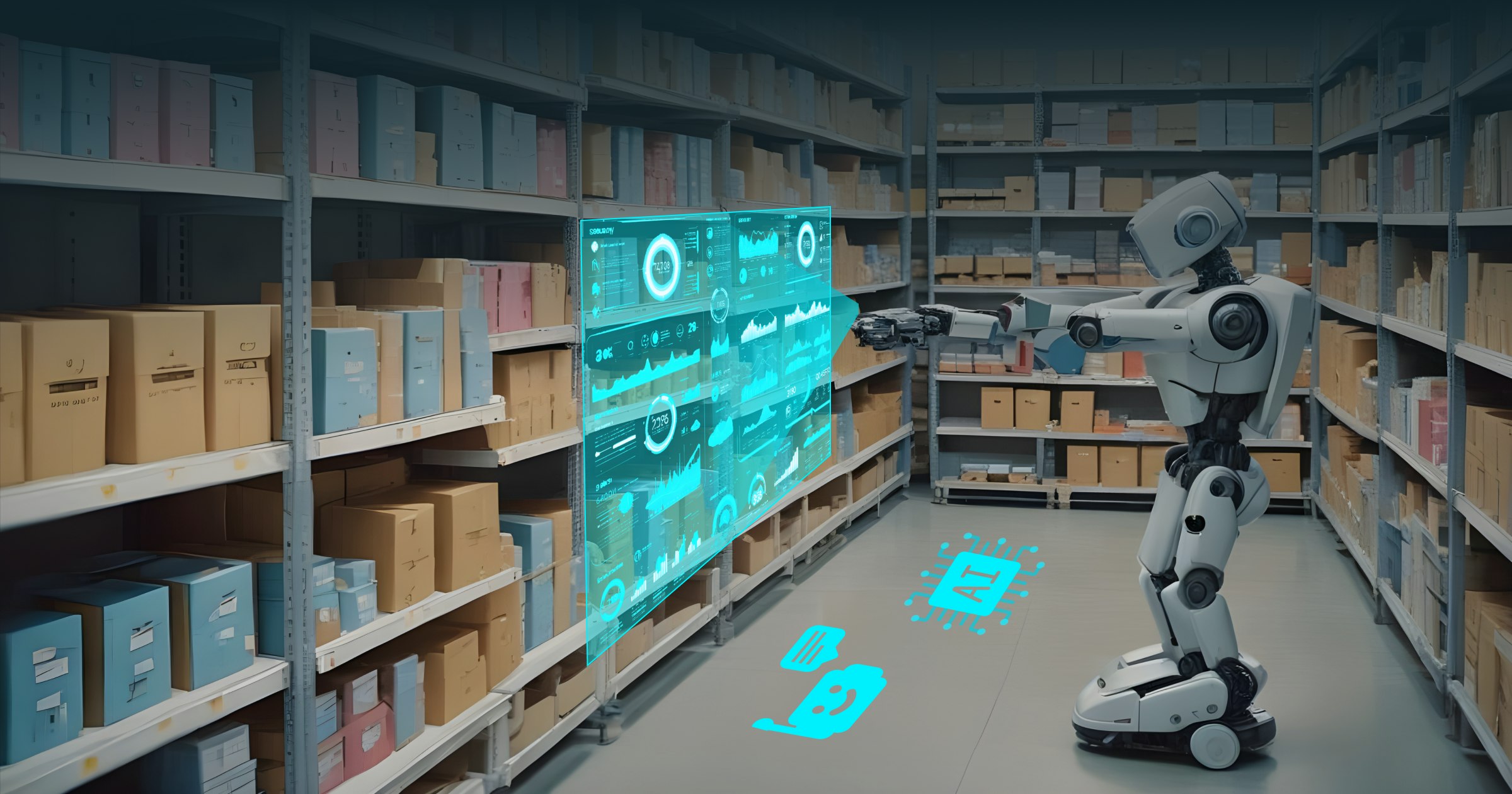Table of Content
As businesses adjust to shifting demand patterns and expand to foreign markets, managing inventory smoothly has become a priority.
Today, it’s more important than ever to balance having enough inventory to cater to global demand and not being saddled with excess inventory while ensuring the business’ financial health.
But suppose you’re serving at a smaller scale. In that case, you certainly can’t afford to overstock, as that not only negatively influences the bottom line but also causes waste, which, in turn, is detrimental to the environment.
Challenges of Traditional Inventory Management
Several problems besiege the traditional inventory management landscape, which can be addressed by applying AI-powered solutions. These include:
- A lack of visibility into market demand patterns, especially real-time fluctuations
- A lack of real-time inventory visibility, including both warehouse stocks as well as goods in transit
- Overstocking and understocking, both of which can be costly for the business
- Lack of insight into obsolete products, which are left to take up valuable warehouse space
- Excessive reliance on manual procedures like packing and shipping, which increase the likelihood of errors and order delays
- Lack of insight into techniques for planning and handling perishable stock, both in the warehouse and while being shipped
- Lack of integration with different sales channels, leading to the likelihood of conflicting information about inventory status on different channels
AI in Inventory Management: An Overview of the Transformation
Adopting AI is essential to boost workflow agility and efficiency. Let’s explore the impact of this advanced technology on inventory management:
1. Enhancing accuracy with real-time inventory tracking
Are you looking for a way to avoid stockouts or overstocking but don’t have access to precise instant data on inventory status? Fret not—AI can provide you with up-to-the-minute updates on stock levels by checking inventory levels across different supply chain stages.
For example, as an eCommerce business, leverage AI algorithms to predict demand patterns and automate replenishment processes. This ensures you always have the products your customers want to buy—but in a quantity that doesn’t increase your storage costs or goes waste.
AI boosts customer fill rates by efficiently scanning available inventory and promptly making it available for purchase.
2. Predicting needs with demand forecasting
The impact of AI in demand forecasting is enormous. AI analyzes historical sales data, industry trends, and seasonality to accurately predict future inventory requirements.
It also factors in real-time social media buzz, reviews, and news related to your products, giving you a complete picture of the market dynamics.
With such information at your fingertips, you’re better equipped to handle fluctuations in demand and avoid overproduction or underproduction.
For example, if you’re a fashion retailer, you can predict the upcoming season’s trends by analyzing social media chatter and influencer endorsements through AI.
If a particular style or color is gaining popularity, the system alerts you in advance, allowing you to stock up on high-demand items before they become mainstream.
Conversely, if a trend is fading, you can adjust your inventory levels to avoid excess stock that might need to be marked down later. This holistic approach helps you improve overall supply chain efficiency and stay ahead of the competition.
How Intuz Helps An E-commerce Store with End-to-End Supply Chain Management - Case Study
Explore Now3. Streamlining processes with optimized order management
AI serves a purpose at the point of sale and provides critical support to manufacturers. For starters, it can automate generating purchase orders or refilling requests by utilizing demand forecasts and predefined inventory policies.
It can also identify supply chain inefficiencies and recommend cost-saving measures by analyzing real-time data from multiple sources, such as transportation logistics, production rates, raw material prices, and more.
Imagine you run an auto parts store. When a customer orders a specific type of spark plug, the AI system quickly processes the order, verifies stock availability, and initiates the packing and shipping process, reducing the time taken from order placement to delivery.
AI for stock management is here for the win!
4. Maximizing efficiency through inventory optimization
AI’s ability to dynamically optimize inventory levels by analyzing various factors such as sales patterns, seasonal trends, and lead times is particularly beneficial in the healthcare industry. It ensures proper resource allocation.
Let’s understand this better with an example. As a healthcare facility manager, you’ll always need an ongoing supply of critical medical supplies like gloves, syringes, and masks. But how do you ensure that optimal stock levels are maintained?
By employing sophisticated optimization tools, AI tracks peak times when there’s a greater demand, such as flu season or a local outbreak, ensuring that the facility is well-prepared with sufficient medical supplies to handle the increased patient load.
5. Revolutionizing operations with warehouse automation
AI for warehouse automation includes using robotics, automated guided vehicles (AGVs), and intelligent sorting systems (with sensors and RFID technology) to handle inventory tasks.
These technologies increase the speed and accuracy of your warehouse operations, reduce labor costs, and improve safety. By automating repetitive tasks, you can focus your human resources on more strategic activities, ultimately improving overall productivity.
For example, if your eCommerce business is growing rapidly, consider implementing AI-powered robots to pick and pack orders. This will reduce the workload on human staff and speed up order fulfillment.
Custom AI Solutions for Your Business
Consult nowIndustry-Specific Use Cases of AI Inventory Management
Now, let’s study a few real-world examples of companies using this technology for superior inventory control:
1. E-commerce
Brands like Amazon use AI extensively for both inventory forecasting and delivery logistics.
By studying large volumes of browsing and purchase data, AI algorithms can predict how and when demand will fluctuate across different seasons and geographies, enabling the e-commerce brand to stock products accordingly.
This enables them to plan its warehouse operations by keeping items in stock where they are most needed. AI also helps them plan optimal delivery routes so customers can get their orders as soon as possible.
2. Retail
Chains like Target and Walmart use AI to a similar effect. Algorithms can analyze sales data and consumer behavior patterns to predict what products will be in demand at what time and quantity, enabling the brand to plan inventory before the season.
This is particularly important during busy times of the year, like the holiday season, when retailers are at risk of stockouts and low shelf availability unless they plan.
3. Manufacturing
In manufacturing, AI-powered inventory management ensures that items are manufactured as and when they are needed, without delays or downtime. Part of this involves predicting the need for parts and materials to manufacture goods just in time.
However, this is equally important for predictive maintenance, where machinery health can be monitored in real-time, and repairs can be predicted and implemented in advance.
This ensures that everything is in working order and there are fewer cases of unexpected breakdowns when manufacturing orders need to be fulfilled.
4. Healthcare
Hospitals use AI to predict the demand for medicines and surgical equipment and keep suitable inventories so that patient care needs can be fulfilled on time.
It also helps reduce wastage in medical supplies, which lowers hospital costs and is better for the environment.
Similarly, pharmaceutical companies execute AI-powered inventory management to plan their manufacturing schedule for different medicines.
This is of particular importance for medications that have a brief expiry period or are easily perishable, as pharmaceutical companies can then suitably equip their warehouses and transport facilities to handle those medicines safely.
TensorFlow for Supply Chain Anomaly Detection & Product Integrity
Read nowOver to You
Whether you’re a supply chain manager, a professional in retail, or a business owner, you’ll agree that AI inventory management is set for an upgrade that’s faster, smarter, and more efficient. Having such a powerful technology can, indeed, accelerate production, sale, and delivery.
A decade ago, who could have thought we’d have access to AI-driven robotics that can automate repetitive tasks, ensuring accuracy in inventory handling, or IoT devices that can provide real-time data, enabling precise tracking and monitoring of inventory levels.
Don’t overthink it—embrace AI-driven technologies to improve efficiency, reduce costs, and make data-driven decisions. Transform your business today and secure a competitive edge in the market by integrating AI into your inventory management and demand forecasting strategies.
Start your journey with custom AI solutions from Intuz now to unlock unprecedented growth and operational excellence. Please book a consultation with our AI experts. During the call, you’ll also receive your free AI app development roadmap. Speak to you soon!







